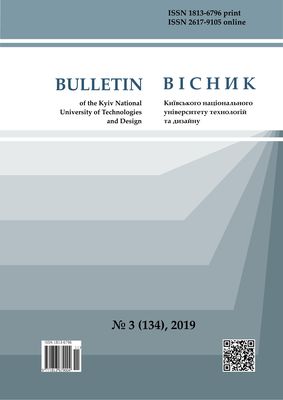DEVELOPMENT OF THE MODIFIED TENT USB-56
DOI:
https://doi.org/10.30857/1813-6796.2019.3.7Keywords:
tent, structure, operation, water resistance, light stability, tests, physical and mechanical parametersAbstract
The purpose of the tent modification type USB-56 is improvements its exploitative characteristics and reduction the cost of its production. Method. During the study of the physical and mechanical properties of the fabric, techniques were used to determine linear dimensions, linear and surface densities, to determine the breaking characteristics during stretching of the fabric, to determine the hygroscopic and water repellent properties of the tissue. All of the previously used methods are from the normative and technical documentations. The selection of samples of tissue was carried out in accordance with the requirements of normative documents. Tests of fabric samples of cotton were conducted in the accredited analytical and experimental testing laboratory of Kyiv National University of Technology and Design. The results of the tests showed that according to physical and mechanical parameters, modified fabric corresponds to the requirements of normative documentations, and according to some indicators exceeds them. However, the results of the tests after irradiation in laboratory conditions using the xenon arc lamp showed that, depending on the exposure area in the natural environment, the aging resistance decreased. Scientific novelty. On the basis of the results of experimental studies of the properties of modified tissue of art. 16sKVgl + VO proved the expediency of its use for the manufacture of tents type USB-56. The dependence of the coefficient of loss of water resistance of the fabric on the region of use of the fabric is determined. Practical value. Recommendations for enhancing the operational properties of the USB-56 tent will form the basis for the development of regulatory documentation for the tent.Downloads
Download data is not yet available.
Downloads
Published
2019-11-12
Issue
Section
Materials Science. Textile and Apparel Manufacturing

